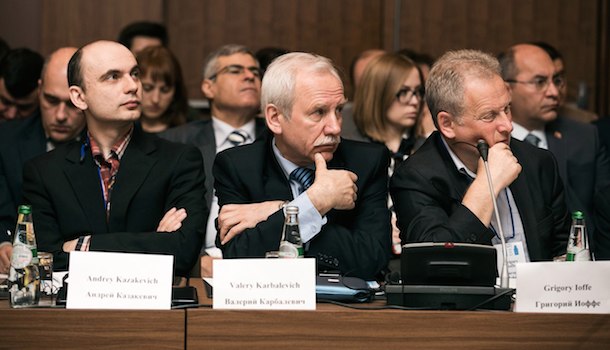Thanks to its effective foreign policy initiatives, Belarus has managed to preserve stability and even become a neutral ground for peaceful negotiations and a donor of regional security. Nonetheless, the level of challenges to its sovereign development remains high.
Geographically and historically, Belarus sits between two competing geopolitical centers – Russia and Europe. Therefore, its foreign policy is guided by the logic of a small state in international relations. In other words, to maximize its sovereignty, security and development Belarus has to maneuver between the two centers of power. At the same time Belarus is a member of the Collective Security Treaty Organization (CSTO) and the Eurasian Economic Union (EEU). Moreover, it has close relations with Moscow, including mutual defense commitments. Yet, the country is interested in normalizing its relations with NATO and the European Union. All these interests form Belarus’s national security architecture and condition its strategic decisions and tactical moves.
Often, external actors fail to appreciate Belarus’s objective security conditions and try to impose their own narratives and interpretations on Minsk. Some of them tend to misunderstand both security threats to Belarus and its ability to be a factor of regional stability.
The Understanding Belarus Security conference, co-organized by the Jamestown Foundation (USA), Konrad Adenauer Foundation (Germany), and the Minsk Dialogue Track-II initiative (Belarus), will aim at overcoming mutual misunderstandings and developing new ideas for strengthening the security of Belarus and the entire region of Eastern Europe.
Format
With the exception of Session 1, the conference will be held under the Chatham House Rule with a view to facilitating open exchange.
Participants
International security experts from the USA, EU, Russia, and Belarus. Diplomats and representatives of defense ministries will be invited as observers.
Objectives
- To analyze the objective foundations and challenges to Belarus’s international security.
- To assess Belarus’s abilities to provide for its own security and to stabilize the regional situation against the backdrop of the problematic relations between Russia and the West.
Program
|
8.30-9.00 |
Registration |
|
9.00-9.30 |
Conference opening, welcoming remarks (open to the media) Valentin Rybakov Deputy Minister of Foreign Affairs of the Republic of Belarus Glen E. Howard President, The Jamestown Foundation, USA Wolfgang Sender Country Director Belarus, Konrad Adenauer Foundation, Germany Yauheni Preiherman Head, Minsk Dialogue Track-II Initiative, Belarus |
|
9.30-10.45 |
Session 1. Belarus and security borderlands: theory and views from the West (open to the media) “Understanding the National Interests of a Small State in Security Borderlands” Yauheni Preiherman Head, Minsk Dialogue Track-II Initiative, Belarus “Understanding Belarus in the West” Vladimir Socor Senior Fellow, The Jamestown Foundation, USA “Understanding Factors for the Multi-Vector Policy of Belarus: A View from Germany” Wolfgang Sender Country Director Belarus, Konrad Adenauer Foundation, Germany “Sitting on the Fence: Can Belarus Balance Between East and West?" Grigory Ioffe Professor of Human Geography, Radford University, USA Moderator Glen E. Howard President, The Jamestown Foundation, USA |
|
10.45-11.15 |
Coffee break |
|
11.15-13.00 |
Session 2. Factors of present-day security situation for Belarus (off-the-record) “The New Geopolitics of Belarus: Finding a New Paradigm for Security” Glen E. Howard President, The Jamestown Foundation, USA “NATO-Russia and NATO-Belarus Relations: Challenges and Opportunities” Dzianis Melyantsou Senior Analyst, Belarusian Institute for Strategic Studies, Belarus “Military Alliances, Belarus and European Security” Paul Hansbury Researcher, St. Antony’s College, Oxford University, UK “The New Military Doctrine of Belarus as a Response to Present-Day Security Threats” Aliaksandr Alesin Military Expert, Belarus “Domestic Factors of International Security of a Small State” Jon Utley Publisher, The American Conservative, USA Moderator Viktar Shadursky Dean, Department of International Relations, Belarusian State University, Belarus |
|
13.00-14.00 |
Lunch |
|
14.00-15.45 |
Session 3. Scenarios of regional developments and their influence on Belarus’s security (off-the-record) “Russia-Ukraine Conflict and Belarus’s Security: Short- and Medium-Term Perspectives” Andrei Skryba Researcher, Centre for Comprehensive European and International Studies, Higher School of Economics, Russia “The Future of the System of European Security: Implications for Belarus” Barend ter Haar Senior Visiting Research Fellow, Netherlands Institute of International Relations; former Director of the Policy Planning Staff at the Dutch Ministry of Foreign Affairs, Netherlands “CSTO Activities in Central Asia: Threats and Challenges for Belarus” Rosa Turarbekova Associate Professor, Department of International Relations, Belarusian State University, Belarus “Countering Unfavorable External Developments: Lessons from Israel” Moshe Maoz Professor Emeritus, Hebrew University of Jerusalem; former advisor to several Israeli Prime Ministers, Israel Moderator Wolfgang Sender Country Director Belarus, Konrad Adenauer Foundation, Germany |
|
15.45-16.15 |
Coffee break |
|
16.15-18.00 |
Session 4. Belarus as a factor of regional security: how to develop the potential? (off-the-record) “Belarus as a Mediator in Regional Security Issues: The Minsk Process and Beyond” Temuri Yakobashvili President, New International Leadership Institute; former Deputy Prime Minister of Georgia, USA-Georgia “Strengthening Regional Stability by Careful Security Positioning: Lessons from Finland and Hungary” Andras Racz Senior Research Fellow, Finnish Institute of International Affairs, Finland “Between NATO and Russia: Lessons from Serbia” Natan Albahari Project Manager, ISAC Fund, International and Security Affairs Fund, Serbia “Helping Belarus to Develop as a Factor of Regional Security” Andrey Rusakovich Chairman of the Board, Foreign Policy and Security Research Center; Chair, Belarusian State University, Belarus Moderator Aliaksandr Filipau Dean, Belarusian State University of Culture and Arts; Expert, Discussion and Analytical Society Liberal Club, Belarus |
|
18.00-18.15 |
Closing remarks |


